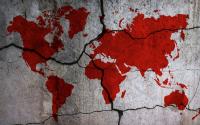15 October 2007The Sydney Morning HeraldRajendra Pachauri
The former United Nations secretary-general, Kofi Annan, brought about a remarkable consensus among world leaders to establish the Millennium Development Goals and for the world to meet these by 2015. But, as Annan's successor, Ban Ki-moon, told about 80 heads of state and government in September, it is now clear that climate change threatens the achievement of these goals, so vital to the wellbeing of human society and the elimination of widespread poverty.
Why is global action urgent and necessary to meet the challenge of climate change? The Intergovernmental Panel on Climate Change has determined that warming of the climate is unequivocal; further, that average northern hemisphere temperatures during the second half of the 20th century were very likely higher than for any other 50-year period in the past 500 years and likely the highest in at least the past 1300 years.
The panel has also determined that most of the observed increase in temperatures since the mid-20th century is very likely due to the increase in anthropogenic greenhouse gas concentrations.
But climate change is not taking place in a smooth, linear fashion. For instance, the frequency of heavy precipitation events has increased over most land areas and so also the duration and intensity of droughts, particularly in the tropics and subtropics.
Climate change is likely to add to several stresses that already exist in the poorest regions of the world and affect the ability of societies in these regions to pursue sustainable livelihoods.
By 2020 between 75 million and 250 million people are projected to be exposed to an increase in water stress due to climate change in Africa. Coupled with increased demand, this will adversely affect livelihoods and exacerbate water-related problems.
Another sector likely to be affected adversely in some of the poorest regions of the world is agriculture. It has been assessed that agricultural production in many African countries and regions would be severely compromised by climate variability and change.
The area suitable for agriculture, the length of growing seasons and yield potential - particularly along the margins of semi-arid and arid areas - are expected to decrease. In some countries yields from rain-fed agriculture could be reduced by up to 50 per cent by 2020.
Another serious impact of climate change is the melting of glaciers all over the world, and this has serious implications for South Asia and parts of China. Glacial melt in the Himalayas is projected to increase flooding and rock avalanches from destabilised slopes and affect water resources downstream within the next two to three decades, due to decreased river flow as the glaciers recede.
Water availability is projected to be affected in Central, South, East and South-East Asia. Given the fact that population growth and increasing demand resulting from higher standards of living would require larger quantities of water, the impact of climate change could adversely affect more than a billion people in respect of water availability in Asia by the 2050s.
Climate change and its impacts in the most vulnerable regions require a careful evaluation of humanitarian assistance across the globe. Increased resources will be required for adaptation to climate change.
This undoubtedly would be a far better approach for the global community to pursue than to provide emergency assistance in the event of catastrophes and extreme events.
There are equity dimensions to climate change that also deserve attention. While adaptation is inevitable and urgent, the increase in emissions of greenhouse gases, if not mitigated by the developed nations, will lead to much higher temperatures and much more serious impacts. It is, therefore, essential to ensure that strategies involving both adaptation and mitigation are pursued.
The cost of mitigation, as assessed by the climate change panel, is very modest in relation to the cost of impacts across the world. If mitigation is not implemented, then income and wealth disparities between nations will increase, and the existence of poverty on a large scale, which should be ethically unacceptable, could pose a threat to global security and stability.
The possibility of large numbers of people becoming environmental refugees is not only a humanitarian problem of serious proportions but also has the potential for social disruption that needs to be avoided.
Stringent mitigation needs to be undertaken immediately, and existing technologies and methods are available for this. Adaptation to climate change, particularly involving the poorest communities in the world, assumes urgency.
In view of the new knowledge provided by the panel, the world needs to take climate change as a serious problem that needs a humanitarian approach.
Dr Rajendra Pachauri is the chairman of the Intergovernmental Panel on Climate Change, which was the joint winner of the 2007 Nobel Peace Prize, and director-general of the Energy and Resources Institute, New Delhi.






